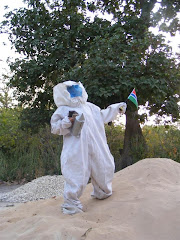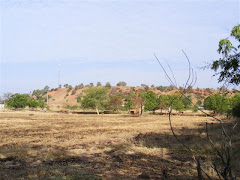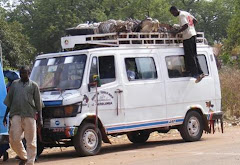I know it’s been a long time since I’ve written anything on this blog, but it isn’t just because I’ve been too busy or too lazy to write. I’ve been meaning to write for a long time now, but for some reason I could never bring myself to sit down and start writing. It’s not because I’ve been unhappy or have nothing to say, and for a long time I didn’t know what it was exactly. But just recently I realized what it was which has prevented me from writing: life has become ordinary again. And for the same reason that I don’t feel the need to write a blog about my daily life in the States, about my day at the office or my hellish commute to work, I don’t feel the need to write about my life here anymore. I know that my life here would still seem interesting to somebody back home, just because my life is so different. But to me, it doesn’t seem different anymore. Donkey carts, shirtless women, sweating 24 hours a day, heat rash, the frustrations and rewards of working and living with Gambians, the long, empty hours of the afternoon have become ordinary.
In a way it’s funny, because I had partially joined the Peace Corps to escape the daily grind of American life. But now I see that any life can become slightly dull and routine after enough time. At the same time, though, I don’t want to give the impression that I’m bored or unhappy with my life here. On the contrary, I feel a deep satisfaction that I have managed to adjust so much in just one year’s time that things that seemed completely overwhelming and foreign when I first came here, now seem so ordinary that I forget to notice them. I feel proud that I can speak comfortably in a language I had never heard just a year ago, that I now feel comfortable living among people I understood nothing about such a short time ago. And I also realize that even though life has become routine here, and I’m not experiencing life at the same intensity I was when I first came here, I have permanently widened my vision of the world because I have lived in two extreme situations and experienced them both as “normal”.
One thing that finally sparked me to write this was reading a National Geographic from September, 1964 about the Peace Corps. In it, one woman talks about her experience in the Peace Corps in Tanganyika (now Tanzania) and how the strange becomes the familiar:
“How did it happen, then, that the days just began to roll on, blending one into the other? It wasn’t that new experiences and interesting things ceased happening, but that the strange became familiar so quickly, and the unexpected became part of the daily routine—even in Africa.” –Ruth Dygert
I read an article recently that talked about how our understanding of what is “normal” begins to expand when we are children. The first time you sleep over at a friend’s or neighbor’s house when you are a kid, you are suddenly made aware that people outside of your family do things completely differently than you. When your friend’s mom brings you a peanut butter and jelly sandwich, you think, “This isn’t right. PB&J is supposed to be on Orowheat bread with Smuckers grape jelly and Peter Pan chunky peanut butter. This is on white bread with the crusts cut off and some weird jelly and creamy peanut butter. You suddenly realize that what you always thought was the “right” way, is just one way among many possibilities. To your friend, his mom’s PB&J sandwich is the “right” way just as much as your mom’s is the right way to you. In a way, I feel like what I’ve gone through in the past year is a similar experience on a bigger scale. I no longer consider things I took for granted before as the “right” way. Now I see that the way I learned to do things is just one way, not necessarily the best way. And I can offer a different perspective to people here. I don’t have to tell them that I know how to make the best PB&J sandwich in the world, but I can show them a different way of making it that maybe they never thought of before.
That said, it doesn’t mean that I can completely embrace everything about Gambian culture. In fact, there are a lot of things that still drive me crazy even though I try to keep an open mind and a non-judgmental perspective. It’s a constant internal battle. And it changes from day to day. Some days I just think whatever and go with the flow. Other days, I think I don’t have to like the way things are done here. One thing that I have a hard time coping with is the philosophy of “God wills it”. It seems to serve as an excuse for a lack of hard work, self-help or drive a lot of time. It’s basically an attitude of there’s no point in trying since it’s up to fate anyway. At the same time, I understand that this attitude is also a great coping mechanism in a place where people have few opportunities and often very difficult lives. If you believe that your suffering is God’s will, it makes the burden much easier to carry. In terms of development, though, it makes things very difficult to progress. In a way, trying to better yourself or your situation is seen as trying to contradict God’s will, a sign of ultimate arrogance. The result is that the situation never improves. And when foreigners come in to give away their money and supplies, it is not seen as a stepping stone to a better life, but simply more of God providing for them and who will again provide for them. An NGO provides a fence and well for the women’s garden, the women use the garden until animals start getting in through the fence and eating all their food. Instead of trying to fix the fence or raise the money to rebuild the fence, they simply stop using the garden until someone else comes along and offers to pay for another fence for them.
Another aspect of Gambian culture that I struggle with constantly is my role as a white woman here. Gambia is still a very traditional and paternalistic society. Girls get married off as early as 14, and it is completely acceptable for a man to have as many as four wives. Women’s work and men’s work is very clearly divided. Women take care of the children, cook, clean, work in the gardens and rice fields, take care of the sheep and goats, buy and sell at the market. Men work in the fields growing peanuts, corn and millet, take care of the cows, build and repair things and sit around a lot drinking attaya. I, as an unmarried, educated working woman do not fit in any way into the Gambian mold. Traditions are changing slowly here. It is more and more common to see girls finishing high school and more and more women are entering the work place. But at the village level, very little has changed and very little will change as long as other aspects of traditional life remain the same. In fact, at the village level, life has changed very little over the past centuries. The main difference is that now a few of the wealthier people have cell phones, people wear hand-me-down Western clothes and think 50 Cent is some kind of American king.
In some ways I feel lucky to live in a place that time has seemed to forget. How else could I experience a reality so different from the one I grew up with? And there are some very charming aspects of life here that I know I will miss when I go home. I will miss the slow, relaxed pace of life, the incredibly strong family and community ties, the night sky. But at other times, it is incredibly frustrating and saddening to see how little has changed here, and how little choice people have in their lives. On the surface, life can often seem idyllic, there are always happy children running around playing games, women laughing while they work and men chatting under a mango tree drinking attaya. But there is a level of underlying suffering and anger here that you see once you scratch the surface. Almost every Gambian I have gotten the chance to know reveals some of this to me. Almost every Gambian family has lost a child, a loss that I can’t even begin to comprehend. I found out that my host mother lost 4 out of her 6 children. My neighbor lost his wife and infant son, my friend at the office where I work has lost 2 children, one in high school and one small child. And it can be very frustrating to think about how little has changed here when you think that Peace Corps has been in The Gambia for 40 years, and that The Gambia receives the most aid per capita of any country in Africa. And it can be doubly frustrating when you see the corruption and dishonesty that prevents that aid from benefiting the people it is supposed to go to. Like when you see the beans and oil that the World Food Programme donates to Gambian schools for free lunches for school children being sold in the market, or school children being charged for the meals when it is supposed to be free.
But I rant. Life is good. Things are good. I wouldn't want to be anywhere else right now and I wouldn't trade this experience for anything.
Follows my life as a Peace Corps volunteer in The Gambia, from Sep 2007 to Oct 2009.
Subscribe to:
Post Comments (Atom)
.jpg)
.jpg)
.jpg)
.jpg)
.jpg)
1 comment:
It's really overwhelming the quietly stillness than are you experimenting there.
I think you are right saying "the common(normal) is subjective"
If some ways to do certains things has hapenning through so many years, you cannot expect change it for tomorrow... but every thing, every detail done by you will have a repercussion... maybe not tomorrow, not in a month or years... but just working, living, playing or talking with the gambian childs, gave them a new special shine in their minds.
I was wandering how wonderful would be to see the gambian's night stars.
well... sending a big hug.
Ale.
Post a Comment